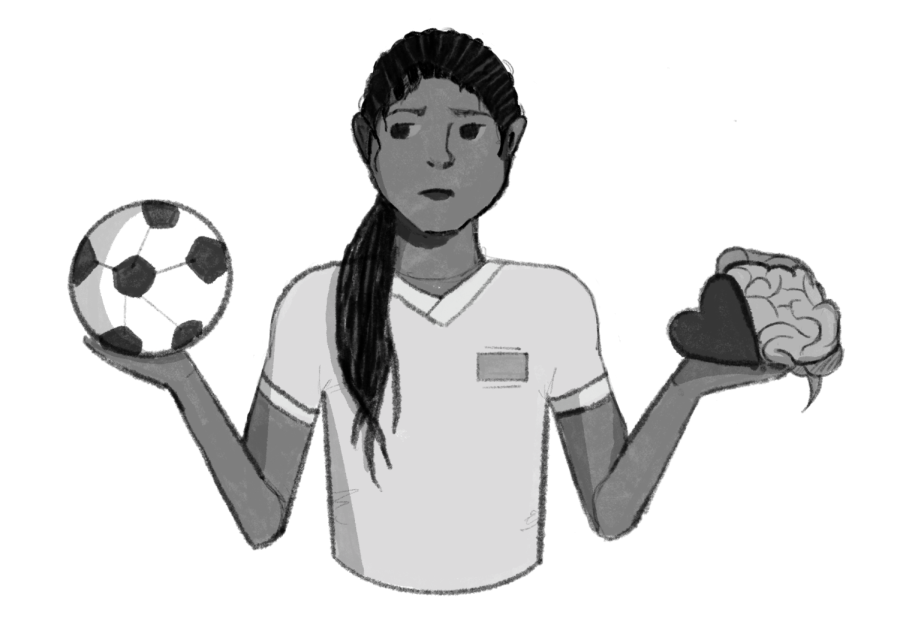SPORTS: Athletes emphasize the importance of health
Many high school sports require athletes to exhibit forms of mental and physical commitment, which has led many student athletes at SCHS to examine where their priorities lie in terms of health factors and their emotional and mental connection to their sport.
Attempting to maintain one health factor, wrestler and track and field member junior Kai Johnson emphasized the importance of prioritizing one’s physical health.
“If you treat your body like it’s just some tool, it will eventually wear out just like every tool, so it’s something that you really want to make sure you’re focused on,” Johnson said. “You want to be able to stay in the condition that you want to be in.”
In addition to the benefits of maintaining one’s physical health, JV soccer player sophomore Siobhan Grace reflected on her mindset throughout her season and noted that athletic performance often supported her lifestyle in a positive manner and acted as an outlet to improve her mental health.
“Anything in my life, everytime I’m playing soccer, it just goes away, so that helps so much, especially if I’m anxious or I’m sad or anything like that,” Grace said. “I just have soccer, and I refocus and I’m good to go.”
For some sports in particular, physical health is prioritized over mental health in order for the athlete to be able to perform well in their sport. Varsity tennis player sophomore Rehaan Karnik explained that his sport requires players to compete individually, resulting in the athlete’s responsibility to maintain their own health rather than an entire team relying on each other for high-quality athletic performance.
“You can substitute someone struggling or not having a good day (in a team sport), whereas in tennis, you can’t just pull someone up mid match. They have to finish their match,” Karnik said. “Their score goes through.”
Alongside the physical difficulties, Karnik expressed the struggle to sustain a positive mindset in an athletic environment.
“You can be mentally saying, ‘Do I want to do this anymore?’ If I’m not getting better, it’s just a waste of time,’” Karnik said. “Being able to not give up on something, it’s hard to do, like what are your motivations behind it? What do you really want to do, and how much are you willing to put into changing that?”
Cross country and track and field member senior Brian Sawaya described his experience with social isolation over winter break and explained the benefit of staying connected with the communities on campus that not only he values most but also value him most.
“I started to have a lot of trouble going into winter and without having many people around me, I started to feel isolated, alone,” Sawaya said. “Coming back to track was coming back to a community, coming back to people that knew me and coming back to the place I knew.”
SCHS boys and girls golf coach Kevin Vannest reflected on his social exchanges with each athlete and found that they are often an attempt to create a positive environment in which his teams feel supported.
“When I’m on the course, I have so much time that there is a lot of interaction between me and guys individually, like ‘Hey, how’s it going?’ ‘What’s up?’” Vannest said. “Just having a conversation with them, making them feel I care because I do care.”
Accompanying emotional support from coaching staff, Johnson advised athletes to check in with their teammates and encourage a positive, understanding and validating environment within their team.
“If they (a teammate) need a break, respect that boundary and let them have that break, and be able to tell when it’s time that you need to be ready to either focus, or times when you can laugh and play around just so you can balance a little bit of fun with the sport,” Johnson said.
Johnson also recommended that new athletes consider their future in the sport prior to participating in or committing to the often strenuous physical and mental demands of the activity.
“If you can research it and check it before and make sure that you’re physically and mentally ready for it, you might find something that you actually like to love in the long run,” Johnson said.
Grace addressed the burnout that many athletes face when pressured too much to the point where such pressure surpasses healthy encouragement. She recommended athletes work to support their teammates and encourage improvement in healthy moderation to prevent burnout-inducing pressure that can negatively impact both an athlete’s mental and physical health.
“There is a certain line that hasn’t been discussed enough,” Grace said. “The line of pushing someone to be their best and pushing them too far because you can see it in many athletes. A lot of them get burned out because they’re getting pushed too far.”


